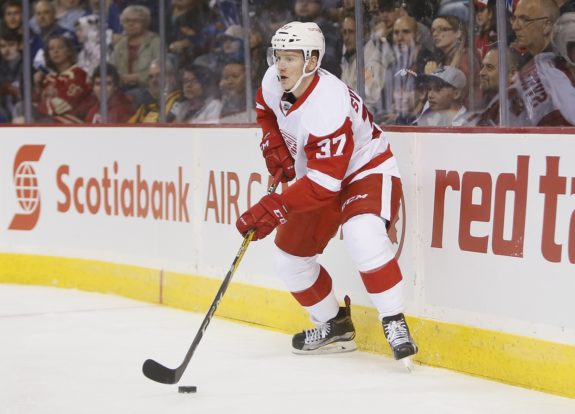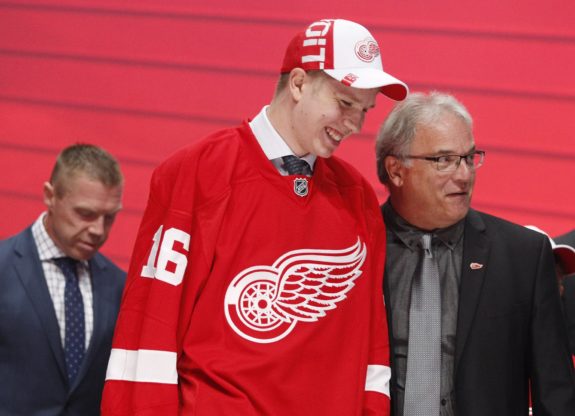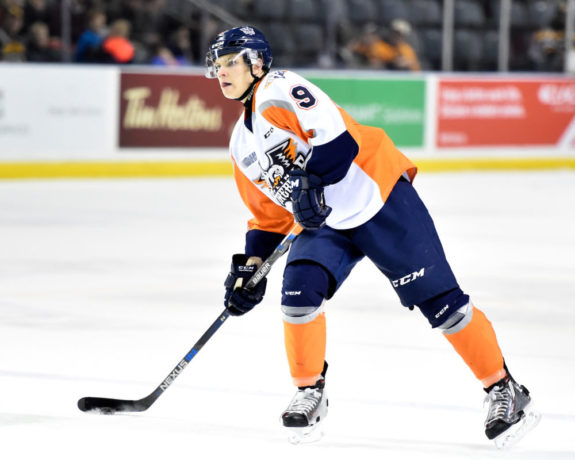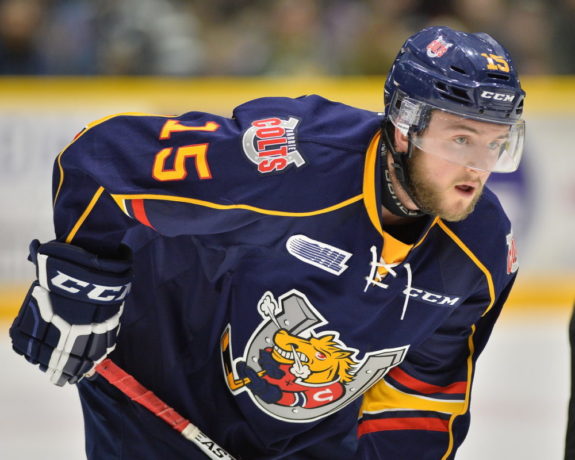Many of the Detroit Red Wings’ top junior players were on display this week at the annual NHL Prospect Tournament. The Wings’ youngsters squared off against prospects from Carolina, Chicago, St. Louis and the New York Rangers, finishing the tournament in sixth place with a record of one win and three losses. While a winning record and statistics ultimately won’t matter in the long run, the yearly competition provides a decent stage to showcase the skills and development of recent draftees.
Players such as Michael Rasmussen, Dennis Cholowski, Filip Hronek and Evgeny Svechnikov were some of the more recognizable names who represented Detroit in this year’s tournament. The rest of the roster was rounded out by free agent invitees and several late-round draft picks looking to make a good impression with the club.

So which names stood out from the rest and looked impressive? Did the big-name players produce up to their draft position? There were a few interesting takeaways I was able to observe while following along with the tournament over the last few days, some surprising, some not so much.
Cholowski Budding on the Blue line
The Red Wings traded down to draft Cholowski in the first-round of the 2016 NHL Draft, a move forced by Detroit needing to ditch Pavel Datsyuk’s contract after he decided to return to Russia to finish out his career. The Arizona Coyotes took Datsyuk’s cap hit, along with Detroit’s 16th overall pick, and selected promising young defenseman, Jakob Chychrun, a player that Cholowski will unavoidably and unfairly be compared to for the rest of his NHL career.
However, during the tournament, Cholowski was the Wings’ most outstanding blue-liner. Physically, he barely resembles the 170 lb teenager that Detroit drafted two summers ago as he has since added almost 20 pounds of muscle. Listed at six-foot-one and 180 lbs, Cholowski isn’t the most imposing defenseman on the ice but looks noticeably bigger, yet comfortable, in his growing body.

The thing that impressed me the most about Cholowski over the course of the tournament was his skating ability. He never appeared to be frantically skating to get himself back into a play or position — he appeared to always find himself moving in the right direction. Whenever the puck was on his stick, Cholowski quickly and fluidly made the play out of the defensive zone. He also netted a power play goal during the second period in a game against the Chicago Blackhawks.
While he appeared to be the most collected blue-liner for the Red Wings over the course of the competition, there were other blueliners who also showed promise. Both Vili Saarijarvi and Jordan Sambrook played well in their respective roles.
Saarijarvi tallied an assist while demonstrating his proclivity for firing pucks at the net from the blue line, while Sambrook hustled, playing his well-rounded defensive style. Sambrook also scored a goal in Detroit’s dominating four to one victory over the Rangers’ prospects.

Saarijarvi (plus-four), Cholowski (plus-three) and Sambrook (plus-two) were the top three Red Wings’ defensemen in plus/minus. While the level of competition and goaltending in a prospect game can tend to skew and lessen the importance of plus/minus statistics, it’s still worth noting that the three blue-liners who stood out to me were also the top three on the score sheet.
Red Wings’ Offense Stays Grounded
Detroit averaged 2.5 goals per game during tournament play, compared to their opponent’s combined average of 3.41 goals for. Despite the low amount of offensive production, a few forwards stood out above the rest. Dylan Sadowy, a former third-round draft pick acquired from the San Jose Sharks in 2016, skated well and furiously through all three zones, scoring two goals in four games played.
Axel Holmstrom, a 2014 seventh-round draft pick, created several scoring chances by skating hard to the net throughout much of the tournament. He recorded one goal and one assist and will be looking to get a shot at the Red Wings’ lineup at some point in the future. His time playing hockey in North America has been plagued by two different injuries to the same knee.

Michael Rasmussen, the ninth overall pick in this summer’s NHL Draft, recorded one assist in four games played. The team utilized the six-foot-six center’s frame for a net-front presence while on the power play, something that Rasmussen will certainly be used for on his journey towards the NHL. He hasn’t played much hockey over the last six months due to a wrist injury, but will undoubtedly be watched heavily by all in Hockeytown as he moves up the ranks of the franchise.